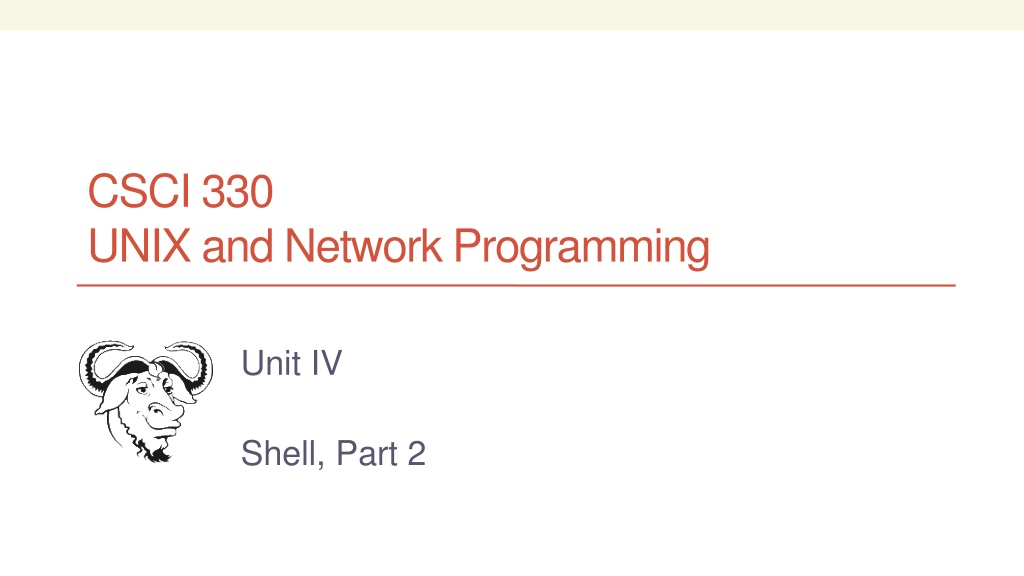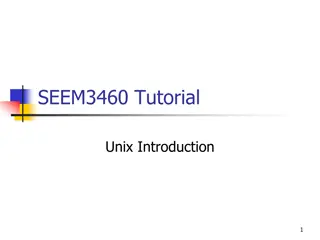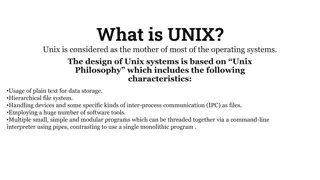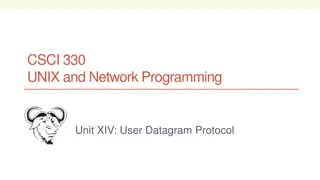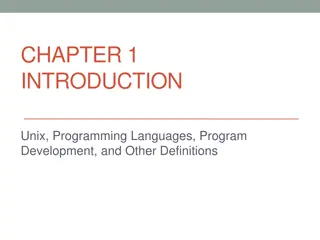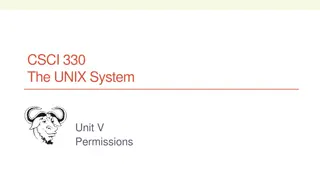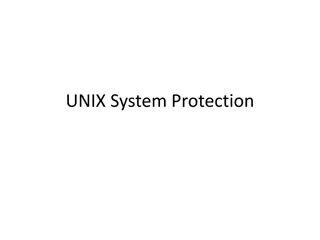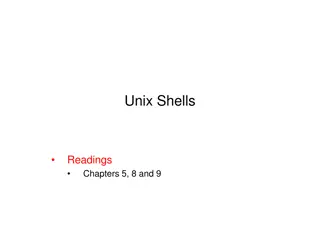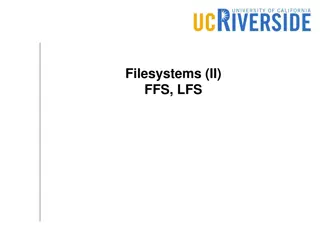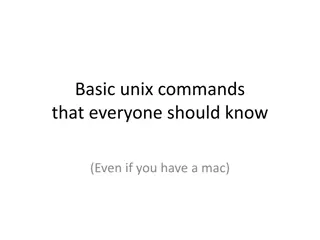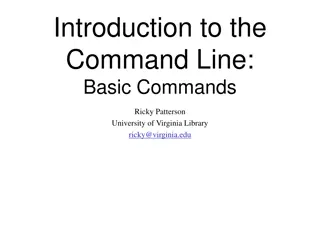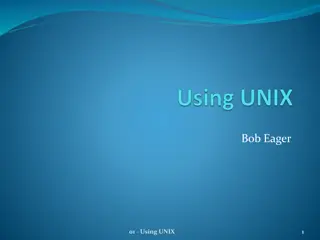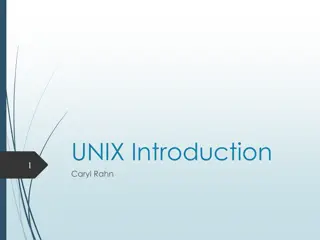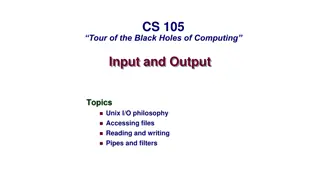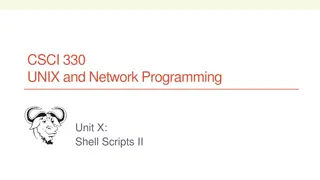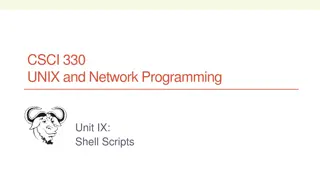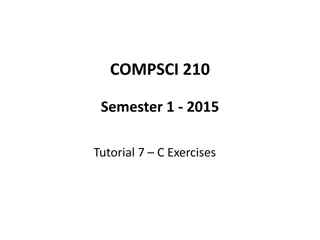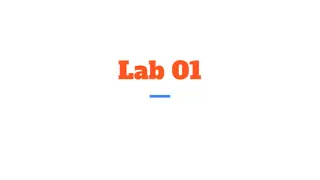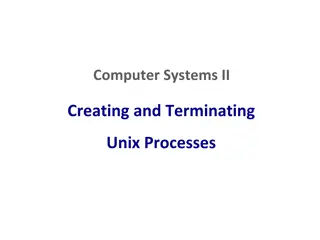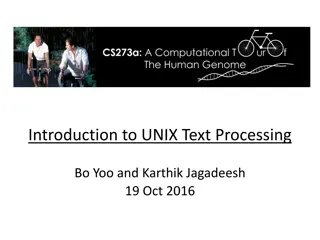UNIX and Network Programming
In this course on UNIX and Network Programming, you will delve into shell basics, wildcards, regular expressions, quoting, and escaping. Understand the behavior of special characters, variable references, command sequences, and more. Explore the use of wildcards to match file names on the command line, including patterns for zero or more characters, exactly one character, ranges, character classes, and entire words. Discover the power of regular expressions for matching strings in a search across various UNIX utilities. Gain insights into metacharacters and their significance in pattern matching.
Download Presentation

Please find below an Image/Link to download the presentation.
The content on the website is provided AS IS for your information and personal use only. It may not be sold, licensed, or shared on other websites without obtaining consent from the author. Download presentation by click this link. If you encounter any issues during the download, it is possible that the publisher has removed the file from their server.
E N D
Presentation Transcript
CSCI 330 UNIX and Network Programming Unit IV Shell, Part 2
CSCI 330 - UNIX and Network Programming 2 more bash shell basics Wildcards Regular expressions Quoting & escaping
CSCI 330 - UNIX and Network Programming 3 Command Line Behavior Special characters have special meaning: $ variable reference = assignment ! event number ; command sequence ` command substitution > < | i/o redirect & background * ? [ ] { } wildcards regular expressions \ quoting & escaping
CSCI 330 - UNIX and Network Programming 4 Wildcards: * ? [ ] { } A pattern of special characters used to match file names on the command line * zero or more characters Ex: % rm * % ls *.txt % wc -l assign1.* % cp a*.txt docs ? exactly one character % ls assign?.cc % wc assign?.?? % rm junk.???
CSCI 330 - UNIX and Network Programming 5 Wildcards: [ ] { } [...] matches any of the enclosed characters [a-z] matches any character in the range a to z if the first character after the [ is a ! or ^ then any character that is not enclosed is matched within [], [:class:] matches any character from a specific class: alnum, alpha, blank, digit, lower, upper, punct { word1,word2,word3,...} matches any entire word
CSCI 330 - UNIX and Network Programming 6 Wildcards: [ ] { } examples % wc l assign[123].cc % ls csci[2-6]30 % cp [A-Z]* dir2 % rm *[!cehg] % echo [[:upper:]]* % cp {*.doc,*.pdf} ~
CSCI 330 - UNIX and Network Programming 7 Regular Expression A pattern of special characters to match strings in a search Typically made up from special characters called meta-characters: . * + ? [ ] { } ( ) Regular expressions are used throughout UNIX: utilities: grep, awk, sed, ... 2 types of regular expressions: basic vs. extended
CSCI 330 - UNIX and Network Programming 8 Metacharacters Any one character, except new line . Any one of the enclosed characters (e.g. a-z) [a-z] Zero or more of preceding character * Zero or one of the preceding characters ? also: \? One or more of the preceding characters + also: \+ Beginning or end of line ^ or $ Beginning or end of word \< or \> Groups matched characters to be used later (max = 9) ( ) also: \( \) Alternate | also: \| Repetition of character x between m and m times x\{m,n\}
CSCI 330 - UNIX and Network Programming 9 Basic vs. Extended Extended regular expressions use these meta-characters: ? + { } | ( ) Basic regular expressions use these meta-characters: \? \+ \{ \} \| \( \)
CSCI 330 - UNIX and Network Programming 10 The grep Utility searches for text in file(s) Syntax: grep "search-text" file(s) search-text is a basic regular expression egrep "search-text" file(s) search-text is an extended regular expression
CSCI 330 - UNIX and Network Programming 11 The grep Utility Examples: % grep "root" /var/log/auth.log % grep "r..t" /var/log/syslog % grep "bo*t" /var/log/boot.log % grep "error" /var/log/*.log Caveat: watch out for shell wild cards if not using
CSCI 330 - UNIX and Network Programming 12 Regular Expression consists of atoms and operators an atom specifies what text is to be matched and where it is to be found an operator combines regular expression atoms
CSCI 330 - UNIX and Network Programming 13 Atoms any character (not a meta-character) matches itself . [...] ^ $ \< \> \1 \2 \3 ... matches any single character matches any of the enclosed characters anchor: beginning or end of line or word back reference
CSCI 330 - UNIX and Network Programming 14 Example: [...]
CSCI 330 - UNIX and Network Programming 15 short-hand classes [:alpha:] letters of the alphabet [:alnum:] letters and digits [:upper:] [:lower:] upper/lower case letters [:digit:] digits [:space:] white space [:punct:] punctuation marks
CSCI 330 - UNIX and Network Programming 16 Anchors Anchors tell where the next character in the pattern must be located in the text data
CSCI 330 - UNIX and Network Programming 17 Back References: \n used to retrieve saved text in one of nine buffers ex.: \1 \2 \3 ...\9 buffer defined via group operator ( )
CSCI 330 - UNIX and Network Programming 18 Operators sequence alternate | {n,m} repetition ( ) group & save
CSCI 330 - UNIX and Network Programming 19 Sequence Operator In a sequence operator, if a series of atoms are shown in a regular expression, there is no operator between them
CSCI 330 - UNIX and Network Programming 20 Alternation Operator: | or \| searches for one or more alternatives Note: grep uses | with backslash
CSCI 330 - UNIX and Network Programming 21 Repetition Operator: \{ \} The repetition operator specifies that the atom or expression immediately before the repetition may be repeated
CSCI 330 - UNIX and Network Programming 22 Basic Repetition Forms
CSCI 330 - UNIX and Network Programming 23 Short Form Repetition Operators
CSCI 330 - UNIX and Network Programming 24 Group Operator: ( ) or \( \) when a sequence of atoms is enclosed in parentheses, the next operator applies to the whole group, not only the previous characters groups define numbered buffers, can be recalled via back reference: \1, \2, \3, ...
CSCI 330 - UNIX and Network Programming 25 Summary: Regular Expressions Any one character, except new line . Any one of the enclosed characters (e.g. a-z) [a-z] Zero or more of preceding character * Zero or one of the preceding characters ? also: \? One or more of the preceding characters + also: \+ Beginning or end of line ^ or $ Beginning or end of word \< or \> Groups matched characters to be used later (max = 9) ( ) also: \( \) Alternate | also: \| Repetition of character x between m and m times x\{m,n\}
CSCI 330 - UNIX and Network Programming 26 Quoting & Escaping allows to distinguish between the literal value of a symbol and the symbols used as meta-characters done via the following symbols: Backslash (\) Single quote ( ) Double quote ( )
CSCI 330 - UNIX and Network Programming 27 Backslash (\) also called the escape character preserve the character immediately following it For example: to create a file named tools> , enter: % touch tools\>
CSCI 330 - UNIX and Network Programming 28 Single Quote (') protects the literal meaning of meta-characters protects all characters within the single quotes exception: it cannot protect itself Examples: % echo 'Joe said "Have fun *@!"' Joe said "Have fun *@!" % echo 'Joe said 'Have fun'' Joe said Have fun
CSCI 330 - UNIX and Network Programming 29 Double Quote (") protects all symbols and characters within the double quotes, expect for: $ (dollar sign) ! (event number) ` (back quote) \ (backslash) Examples: % echo "I've gone fishing" I've gone fishing % echo "your home directory is $HOME" your home directory is /home/student
CSCI 330 - UNIX and Network Programming 30 Quoting Examples: % echo "Hello Ray []^?+*{}<>" Hello Ray []^?+*{}<> % echo "Hello $USER" Hello student % echo "It is now `date`" It is now Mon Feb 25 10:24:08 CST 2012 % echo "you owe me \$500" you owe me $500
CSCI 330 - UNIX and Network Programming 31 Summary wildcards regular expressions grep quoting
